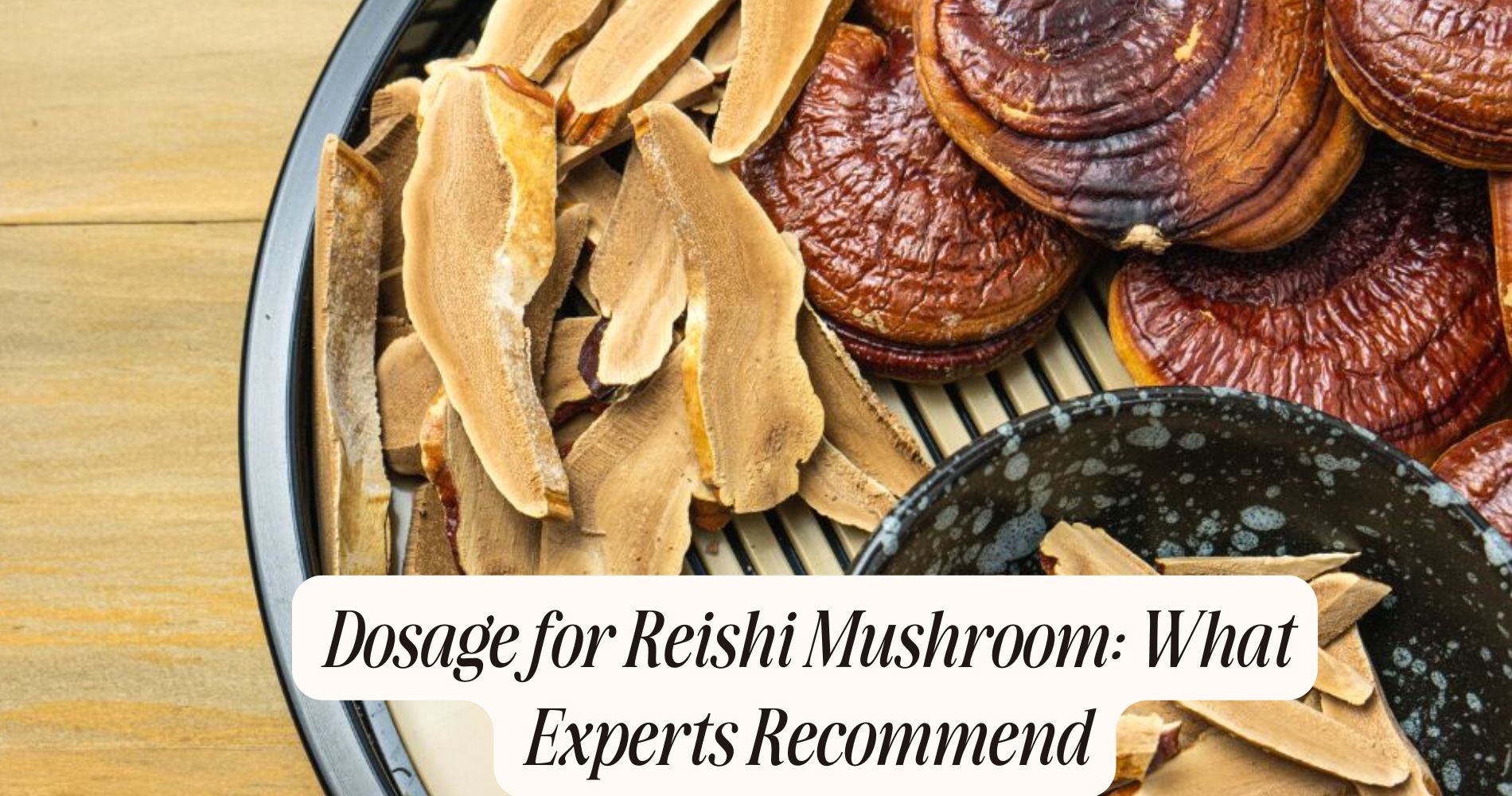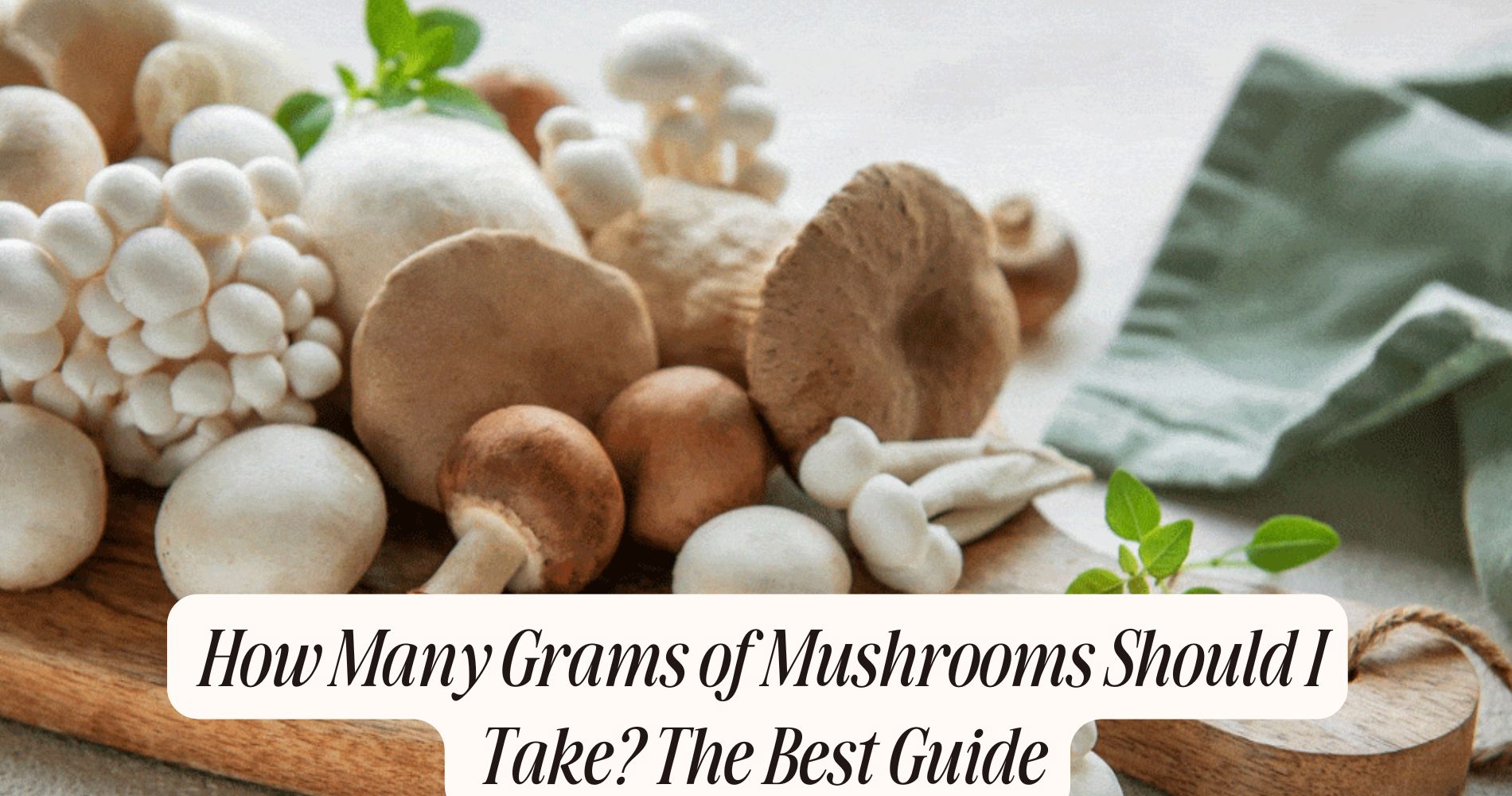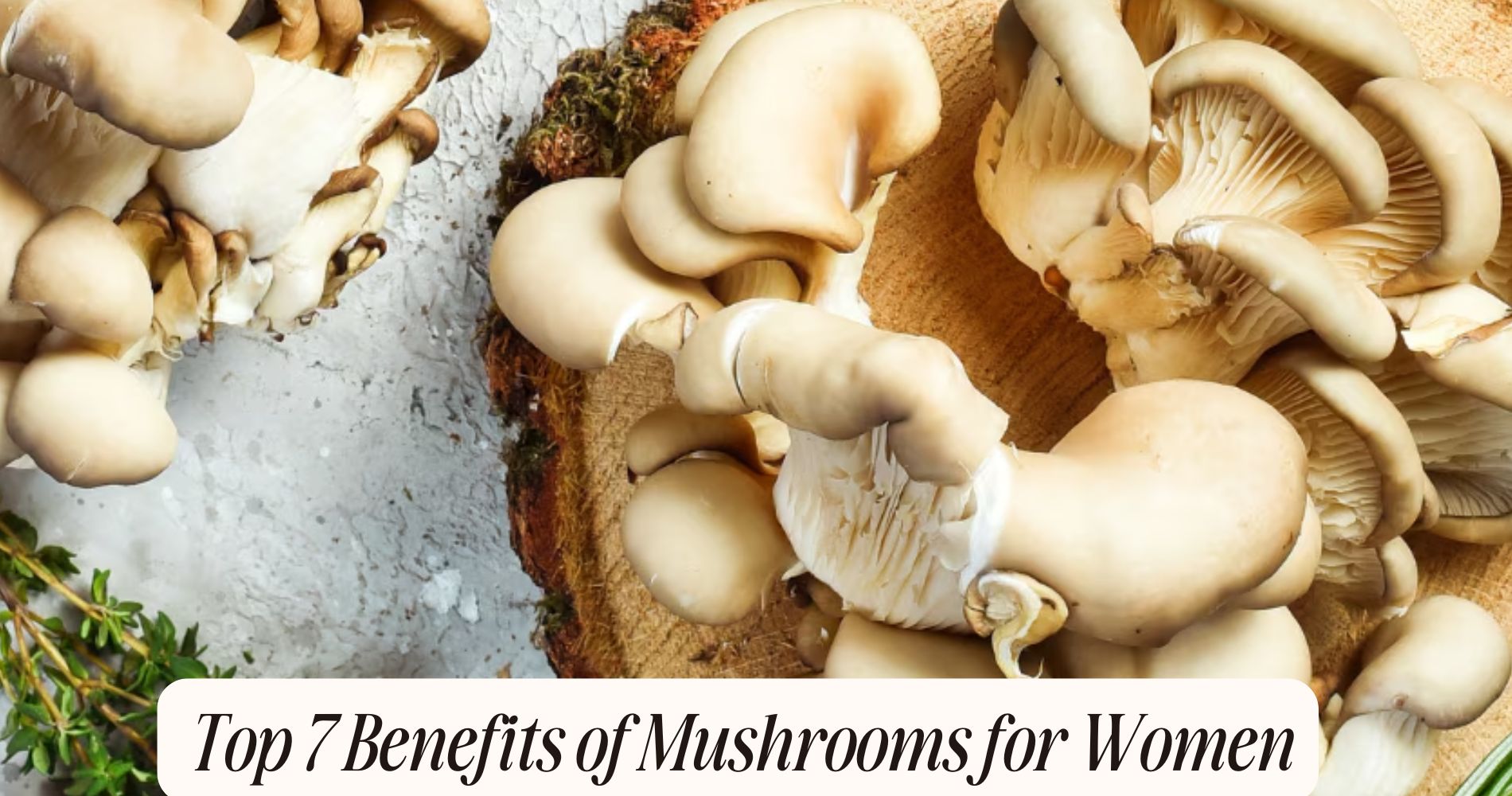
Dosage for Reishi Mushroom: What Experts Recommend
When determining the right dosage for reishi mushroom, experts typically recommend starting with 1 to 3 grams per day. This equals 1,000 to 3,000 mg, depending on whether you’re using capsules, powders, or extracts. The ideal dosage can vary based on your health needs and any medications you may be taking, so it’s best to tailor your intake accordingly. Gradually increasing the dosage while monitoring your body’s response is a smart approach. For optimal results, consult a healthcare professional. Want to learn more about reishi’s forms and benefits? There’s plenty to explore!
Overview of Reishi Mushroom
Reishi mushroom, known scientifically as Ganoderma lucidum, stands out in the world of medicinal fungi for its potential health benefits and longstanding history in traditional medicine.
Historically, you've likely encountered reishi in Eastern cultures, where it's revered as a symbol of longevity and health. Its traditional uses span thousands of years, with references found in ancient Chinese texts that highlight its role in promoting overall wellness and liveliness.

The medicinal history of reishi is rich and multifaceted. In traditional Chinese medicine, it's often utilized to support immune function, reduce stress, and enhance sleep quality.
Modern research has begun to corroborate some of these traditional uses, providing a bridge between ancient practices and contemporary scientific inquiry. You might find it fascinating that reishi is sometimes dubbed the "mushroom of immortality," reflecting its esteemed position in herbal medicine.
As you explore the potential of reishi, you'll see how its historical context informs current uses. Understanding this background can enhance your appreciation for the mushroom and guide you in making informed choices regarding its application in your wellness routine.
Health Benefits of Reishi
For centuries, traditional medicine has celebrated the health benefits of reishi mushroom, and modern research is beginning to validate many of these claims.
One of the most compelling benefits is its potential for immune support. Studies have shown that reishi can enhance immune function by modulating the activity of white blood cells, thereby improving the body's ability to combat infections and diseases. This makes it a valuable ally in maintaining overall health.
Additionally, reishi mushroom is known for its stress relief properties. Research indicates that it may lower levels of cortisol, the hormone associated with stress. By promoting a state of relaxation, reishi can help you manage stress more effectively, which is essential in today's fast-paced world.
This dual action of boosting immunity while alleviating stress makes reishi a unique supplement for those looking to enhance their well-being.
Recommended Dosage Guidelines
When considering Reishi mushroom supplementation, it's essential to understand the recommended dosage guidelines that can vary based on individual needs.
You'll need to take into account factors like your health status and the specific form of Reishi you're using, whether it's powder, capsules, or extracts.
Establishing a standard daily dosage can help you maximize the potential benefits while minimizing any risks.
Standard Daily Dosage
Many people look to Reishi mushroom for its potential health benefits, but determining the right dosage can be crucial for maximizing its effects. The standard dosage recommendations for Reishi typically range from 1,000 to 3,000 mg of the extract daily. This range is often based on studies indicating ideal benefits in immune support, stress reduction, and overall wellness.
When considering reishi dosage, it's essential to recognize that the form of Reishi you're using—whether powder, capsules, or tincture—can influence the appropriate amount. Extracts are more concentrated, so a smaller dosage may suffice compared to powdered forms.

Additionally, some individuals may find that starting on the lower end of the recommended dosage allows for gradual adjustment and minimizes potential side effects.
It's also wise to consult with a healthcare provider before beginning any new supplement regimen, especially if you're pregnant, nursing, or have existing health conditions.
Factors Affecting Dosage
Several factors can influence the ideal dosage of Reishi mushroom for individuals. First, personal health plays a significant role. If you have pre-existing conditions or are taking medications, it's important to consult a healthcare professional before starting Reishi. Your body's unique biochemistry can affect how you metabolize the mushroom, potentially necessitating adjustments in dosage.
Lifestyle factors also come into play. Your diet, level of physical activity, and stress management techniques can impact how effective Reishi is for you. For instance, if you lead a highly active life or deal with significant stress, you might require a higher dosage to achieve the desired benefits, such as improved immune function or reduced anxiety.
Moreover, age and weight can affect how your body responds to supplements. Younger individuals or those with a higher body weight may need to adjust the dosage accordingly.
Finally, the specific goals you aim to achieve with Reishi—be it enhanced sleep or immune support—will influence how much you should take. Always listen to your body and, when in doubt, seek guidance from a healthcare professional to determine the most suitable dosage for your needs.
Different Forms Available
Reishi mushroom is available in various forms, each with its own recommended dosage guidelines. You can find reishi as a powder, extract, capsule, or tea. Each form has different potency levels and bioavailability, influencing how much you should take.
For powdered reishi, experts usually recommend a dosage of 1 to 2 teaspoons per day. If you opt for capsules, the typical dosage ranges from 1000 to 3000 mg daily, depending on the concentration of the extract. With liquid extracts, a common guideline suggests 2 to 3 ml, taken once or twice daily.
It's vital to take into account the specific reishi varieties you're using, as different strains may have varying levels of active compounds. For example, red reishi is often highlighted for its health benefits, while black and white varieties may have unique properties.
Always start with a lower dosage to assess tolerance, gradually increasing it as needed. Consulting with a healthcare professional before starting any new supplement is important, especially if you're taking other medications or have underlying health conditions.
Factors Influencing Dosage
When considering the dosage of Reishi mushroom, various factors come into play that can greatly influence its effectiveness. Your individual health is a key determinant; people with underlying conditions or those taking medications may require adjustments to their dosage. For instance, individuals with compromised immune systems might benefit from higher doses, while others may experience adverse effects at the same level.
Lifestyle factors also notably affect how Reishi works for you. Your diet, exercise routine, and stress levels can influence how your body absorbs and utilizes the mushroom's compounds. If you lead a high-stress lifestyle, you might find that a higher dosage is necessary to experience the calming effects of Reishi. Conversely, if you're generally healthy and active, a lower dose might suffice.
Moreover, age can play a role in determining the appropriate dosage. Older adults may metabolize substances differently, necessitating lower doses to avoid potential side effects.
Ultimately, it's essential to consult a healthcare provider to tailor the dosage based on these individual nuances, ensuring you're maximizing benefits while minimizing risks.
Different Forms of Reishi
When considering different forms of Reishi, you'll find that powdered form offers unique benefits, such as easier incorporation into smoothies or teas.
Capsules provide convenience and precise dosing, while extracts may deliver higher concentrations of active compounds.
Analyzing these options can help you determine the best fit for your health goals.
Powdered Form Benefits
The powdered form of Reishi mushroom offers a convenient and versatile option for those looking to harness its health benefits. Using Reishi powder allows you to easily incorporate it into your daily routine, whether you mix it into smoothies, teas, or soups. This flexibility enhances compliance with usage recommendations, making it simpler to achieve your desired dosage.
Research suggests that powdered Reishi provides various health benefits, including immune support, stress reduction, and improved sleep quality. Its bioactive compounds, such as triterpenes and polysaccharides, are preserved in the powdered form, ensuring you receive the full spectrum of therapeutic effects.

When considering dosage, experts commonly recommend starting with 1 to 3 grams per day, gradually increasing to assess your tolerance and the benefits you experience.
Additionally, Reishi powder has a long shelf life, making it a practical choice for long-term use. Its concentrated nature means you can reap its powdered benefits without consuming large volumes.
However, always consult with a healthcare professional before starting any new supplement regimen, especially if you have existing health conditions or are taking medications.
Capsule vs. Extract
Choosing between capsules and extracts of Reishi mushroom can considerably impact your health outcomes and convenience.
Capsules offer several benefits, including convenience and precise dosage. They're easy to take, especially for those who dislike the taste of mushrooms or powders. With capsules, you know exactly how much Reishi you're consuming, which simplifies tracking your intake.
On the other hand, extracts are known for their potency. They often contain higher concentrations of active compounds, such as triterpenes and polysaccharides, which can enhance their therapeutic effects. If you're aiming for specific health benefits, such as improved immune function or stress relief, extracts might provide a more effective solution due to their superior bioavailability.
However, the choice between them ultimately depends on your personal preferences and health goals. If you prioritize convenience and consistency, capsules might be your best bet. If you're looking for maximum potency and are comfortable with adjusting dosages, extracts could be the way to go.
Consider consulting with a healthcare professional to determine which form aligns best with your individual health needs and lifestyle.
Potential Side Effects
Reishi mushroom, often hailed for its health benefits, can also pose potential side effects that users should be aware of. While many people tolerate Reishi well, some may experience allergic reactions. Symptoms can range from mild skin rashes to more severe responses, highlighting the importance of monitoring your body's reaction, especially if you're new to supplementation.
Additionally, long-term effects of Reishi use aren't fully understood. Research suggests that while short-term use is generally considered safe, prolonged usage might lead to gastrointestinal discomfort or other issues. Some users report nausea, diarrhea, or stomach upset, particularly when taking higher doses.
It's vital to start with a lower dosage and gradually increase it, allowing your body to adjust. If you have underlying health conditions or are pregnant, you should consult a healthcare professional before starting Reishi. This is particularly true if you're taking it for extended periods.
Interactions With Medications
Understanding the potential interactions between Reishi mushroom and various medications is vital for safe supplementation. Research indicates that Reishi can influence the effectiveness of certain drugs, particularly those that affect blood clotting. For instance, if you're taking anticoagulants like warfarin, combining them with Reishi might increase the risk of bleeding due to its antiplatelet properties.
Additionally, Reishi may interact with immunosuppressants. If you're on medications to suppress your immune system after an organ transplant, Reishi could potentially enhance immune responses, undermining the intended effects of your medication.

Another area of concern involves blood sugar levels. If you're using diabetes medications, Reishi might lower blood sugar further, leading to hypoglycemia. It's essential to monitor your levels closely if you decide to incorporate this mushroom into your regimen.
Lastly, always consider herbal interactions. Combining Reishi with other herbs that also affect blood pressure or blood sugar can compound effects and lead to unpredictable results.
Consulting with a healthcare provider before starting Reishi is key to preventing adverse drug interactions and ensuring safe use with your current medications.
Tips for Choosing Quality Supplements
When it comes to selecting quality Reishi mushroom supplements, it's crucial to look for products backed by scientific validation. Start by researching the brand's commitment to quality sourcing. High-quality Reishi supplements use mushrooms cultivated in ideal conditions, often in their native habitats, ensuring the highest levels of active compounds.
Next, check for supplement certifications. Look for third-party testing labels, such as NSF or USP, which verify the product's purity and potency. These certifications indicate that the supplement has been rigorously tested for contaminants and meets specific quality standards.
Additionally, scrutinize the ingredient list. Quality Reishi supplements should contain minimal fillers or additives, and ideally, the product should specify the extraction method used—hot-water extraction is often preferred for maximizing beneficial compounds.
Pay attention to the dosage of active ingredients, such as triterpenes and polysaccharides, as these are key indicators of efficacy.
Lastly, reading customer reviews can provide insight into the product's effectiveness and the manufacturer's reputation. By prioritizing quality sourcing and supplement certifications, you'll increase your chances of choosing a Reishi mushroom supplement that delivers the health benefits you're seeking.
Effortless Wellness with SUPER MUSHROOM GUMMIES
If you’re navigating the ideal dosage for reishi mushroom and want an easy way to enjoy its benefits, Well Gummies' SUPER MUSHROOM GUMMIES are the perfect choice. Each gummy contains a precise blend of 10 functional mushroom types, including reishi, offering immune support, stress relief, and enhanced focus. With a delicious fresh wild berry flavor, they’re convenient, pre-dosed, and free from the guesswork of traditional supplements. Experience balanced energy and natural wellness effortlessly with SUPER MUSHROOM GUMMIES!
Frequently Asked Questions
Can I Take Reishi Mushroom Daily?
You can take reishi mushroom daily to potentially enhance your health benefits. However, it's essential to monitor your body's response and consult a healthcare professional to guarantee safety and effectiveness in your personal regimen.
Is Reishi Safe for Children?
Reishi isn't typically recommended for children due to insufficient research on safety and appropriate dosage. While it offers potential benefits, consult a healthcare provider to ascertain it's safe and suitable for your child's needs.
How Long Does It Take to See Results?
You'll typically notice results from reishi after about four to six weeks of consistent use. The effects can vary, with duration depending on individual health factors, lifestyle, and dosage, impacting your overall experience.
Can I Combine Reishi With Other Supplements?
You can combine Reishi with other supplements, but be cautious of potential interactions. Research suggests certain supplement combinations may enhance benefits or cause adverse effects, so consult a healthcare professional for personalized advice on Reishi interactions.
What Should I Do if I Miss a Dose?
If you've missed a dose, don't panic. The recommended action is to take it as soon as you remember, unless it's almost time for your next dose. In that case, skip the missed dose.
Conclusion
In conclusion, finding the right dosage of reishi mushroom requires careful consideration of your individual health needs and the specific product you choose. Experts generally recommend starting with a low dose and gradually increasing it while monitoring your body's response. Remember, factors like your age, health conditions, and the form of reishi can affect the ideal dosage. Always consult a healthcare professional before adding reishi to your regimen to guarantee safety and effectiveness.




